Optimizing Spectral and Energy Efficiency in 5G Cognitive Radios using Multi-Objective Optimization Algorithms
Problem Definition
The issue of inefficiency within 5G Cognitive Radio systems is a critical problem that needs to be addressed. With the ineffective use of spectrum and energy capacities, these systems are not operating at their optimal levels. The existing literature highlights substantial inadequacies in comparison to a base paper, particularly in terms of energy and spectrum efficiency. Finding a solution to enhance both spectrum and energy efficiency has proven to be a challenging task, as indicated in a recent 2020 paper. The lack of efficient utilization of resources not only impacts the performance of 5G Cognitive Radio systems but also hinders their ability to meet the growing demands of wireless communication networks.
Without addressing these inefficiencies, the potential of 5G technology cannot be fully realized, leading to limitations in network capacity, reliability, and overall user experience.
Objective
The objective is to address the inefficiency issue within 5G Cognitive Radio systems by focusing on enhancing spectrum and energy efficiency through the utilization of multi-objective optimization algorithms in MATLAB. The goal is to demonstrate the effectiveness of these algorithms in improving efficiency, analyze the impact of changing the number of users on energy efficiency, power, and network capacity, and ultimately optimize the 5G cognitive radio network for enhanced performance and efficiency.
Proposed Work
The proposed work aims to tackle the inefficiency issue within 5G Cognitive Radio by focusing on enhancing spectrum and energy efficiency. To achieve this goal, the project will utilize two multi-objective optimization algorithms implemented in MATLAB. By comparing the results with the base paper, the researchers seek to demonstrate the effectiveness of the optimization algorithms in improving both spectrum and energy efficiency. Additionally, the project will analyze the impact of changing the number of users on energy efficiency, power, and network capacity. This comprehensive approach will provide valuable insights into optimizing the 5G cognitive radio network for enhanced performance and efficiency.
Application Area for Industry
This project can be applied in various industrial sectors such as telecommunications, smart manufacturing, automotive, healthcare, and agriculture. In the telecommunications sector, the proposed solutions can help improve the efficiency of 5G cognitive radio networks, leading to better spectrum utilization and reduced energy consumption. In smart manufacturing, these solutions can enhance connectivity and data exchange between machines, optimizing production processes. For the automotive industry, the project can contribute to the development of more reliable and efficient communication systems in vehicles. In healthcare, it can support the implementation of telemedicine services and remote monitoring solutions.
Lastly, in agriculture, the project's solutions can enable better connectivity in smart farming applications, improving crop monitoring and management practices.
By addressing the inefficiencies in 5G cognitive radio networks, this project offers several benefits to different industries. By enhancing spectrum and energy efficiency, organizations can experience improved network performance, reduced operational costs, and increased reliability. The optimization algorithms proposed in this project enable businesses to achieve a balance between spectrum utilization and energy consumption, leading to more sustainable and effective operations. The visualization of results using Pareto front solutions provides valuable insights for decision-making and performance evaluation across various industrial domains, ultimately driving innovation and competitiveness.
Application Area for Academics
The proposed project can significantly enrich academic research, education, and training in the field of 5G cognitive radio networks. Through the implementation of multi-objective optimization algorithms such as the Grasshopper Optimization Algorithm (GOA) and the Antlion Optimization Algorithm (ALO), researchers, MTech students, and PhD scholars can gain insights into enhancing spectrum and energy efficiency within the system. The comparison of these algorithms with those in a base paper provides a valuable learning experience for individuals looking to explore innovative research methods in the domain of cognitive radio networks.
The use of MATLAB as the primary software for the project allows for efficient data analysis, simulations, and visualization of results. This hands-on experience with advanced software tools can enhance the technical skills of students and researchers, preparing them for real-world applications in the field.
Additionally, the project's focus on energy efficiency, power, and network capacity analysis provides a practical understanding of system performance and optimization techniques.
The code and literature generated from this project can serve as a valuable resource for future research endeavors in the field of 5G cognitive radio networks. Researchers can build upon the findings and methodologies presented in this project to further explore optimization algorithms, simulation techniques, and data analysis methods. MTech students and PhD scholars can leverage the insights gained from this project to advance their own studies and contribute to the development of cutting-edge technologies in the field.
In conclusion, the proposed project offers a rich learning experience for academic researchers, educators, and students interested in the field of 5G cognitive radio networks.
By employing advanced optimization algorithms and software tools, the project opens up new avenues for innovative research methods, simulations, and data analysis within educational settings. The application of these techniques in practical scenarios can contribute to the advancement of knowledge and the development of efficient systems in the field of cognitive radio networks.
Reference future scope:
Potential future research directions include exploring additional optimization algorithms, conducting further analysis on different network configurations, and investigating the impact of external factors on energy and spectrum efficiency. By expanding the scope of research in this area, researchers can continue to push the boundaries of knowledge and develop solutions that address the challenges faced by 5G cognitive radio networks.
Algorithms Used
Two multi-objective optimization algorithms - the Grasshopper Optimization Algorithm (GOA) and the Antlion Optimization Algorithm (ALO) - were employed in this project to enhance the spectrum and energy efficiencies of the 5G cognitive radio network. These algorithms were implemented using MATLAB to improve the system's effectiveness. The project aimed to compare the performance of these algorithms with the results presented in a base paper. By changing the number of users in the network, the researchers assessed energy efficiency, power consumption, and network capacity. The outcomes were visualized through Pareto front solutions at different power levels (5db, 10db, 15db) to further analyze the objectives and their trade-offs.
Keywords
5G Cognitive Radio, Spectrum Efficiency, Energy Efficiency, Multi-objective Optimization Algorithms, MATLAB, Grasshopper Optimization Algorithm, Antlion Optimization Algorithm, Network Capacity, Base Paper Comparison, User Interference, Pareto solution, Power variation.
SEO Tags
5G Cognitive Radio, Spectrum Efficiency, Energy Efficiency, Optimization Algorithm, MATLAB, Grasshopper Optimization Algorithm, Antlion Optimization Algorithm, Network Capacity, Base Paper Comparison, Multi-objective, User Interference, Pareto Solution, Power Variation, Research Scholar, PHD Student, MTech Student, Technical Project, Spectrum and Energy Efficiency, Inefficiency Analysis, Research Highlight, Energy and Spectrum Capacity, Effective Solution, Challenging Task, Research Outcome, Code Efficacy, MATLAB Usage, Research Results, Pareto Front Solutions, Power Levels, Online Visibility.
| Shipping Cost |
|
No reviews found!













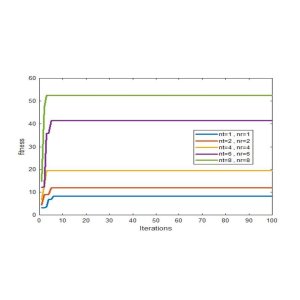
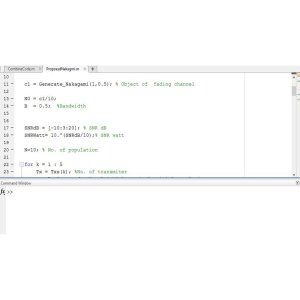
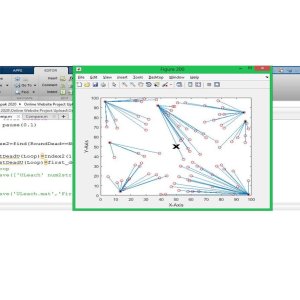
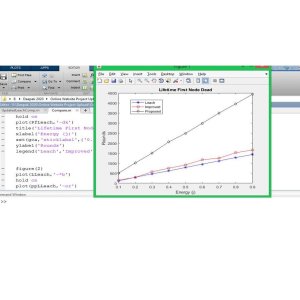
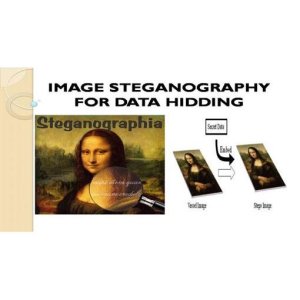


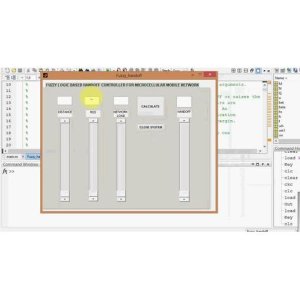

































No comments found for this product. Be the first to comment!